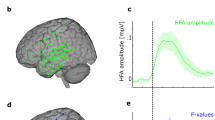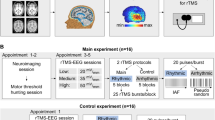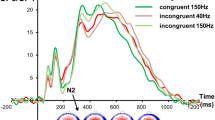Abstract
THE time interval between successive stimuli has been shown in a variety of situations to be crucial for the amplitude of response. For example, at certain intervals, the earlier stimulus may increase the amplitude of the response to the second stimulus. Such a phenomenon is known as facilitation, and has been demonstrated at the neural level, for example, by Lloyd1,2.
This is a preview of subscription content, access via your institution
Access options
Subscribe to this journal
Receive 51 print issues and online access
$199.00 per year
only $3.90 per issue
Buy this article
- Purchase on Springer Link
- Instant access to full article PDF
Prices may be subject to local taxes which are calculated during checkout
Similar content being viewed by others
References
Lloyd, D. P. C., J. Neurophysiol., 9, 421 (1946).
Lloyd, D. P. C., J. Gen. Physiol., 33, 147 (1949).
DeGroot, J., Verb. Kon. Med. Akad. V. Wet., Natuurkunde, Ser. II, 52, 1104 (1959).
Deutsch, J. A., J. Comp. Physiol. Psychol., 58 (1964).
Deutsch, J. A., J. Theoret. Biol., 4, 193 (1963).
Author information
Authors and Affiliations
Rights and permissions
About this article
Cite this article
DEUTSCH, J., COLLINS, R. Facilitation as a Function of Temporal Spacing of Stimuli in Intracranial Self-stimulation. Nature 208, 592–593 (1965). https://doi.org/10.1038/208592a0
Issue Date:
DOI: https://doi.org/10.1038/208592a0
Comments
By submitting a comment you agree to abide by our Terms and Community Guidelines. If you find something abusive or that does not comply with our terms or guidelines please flag it as inappropriate.



